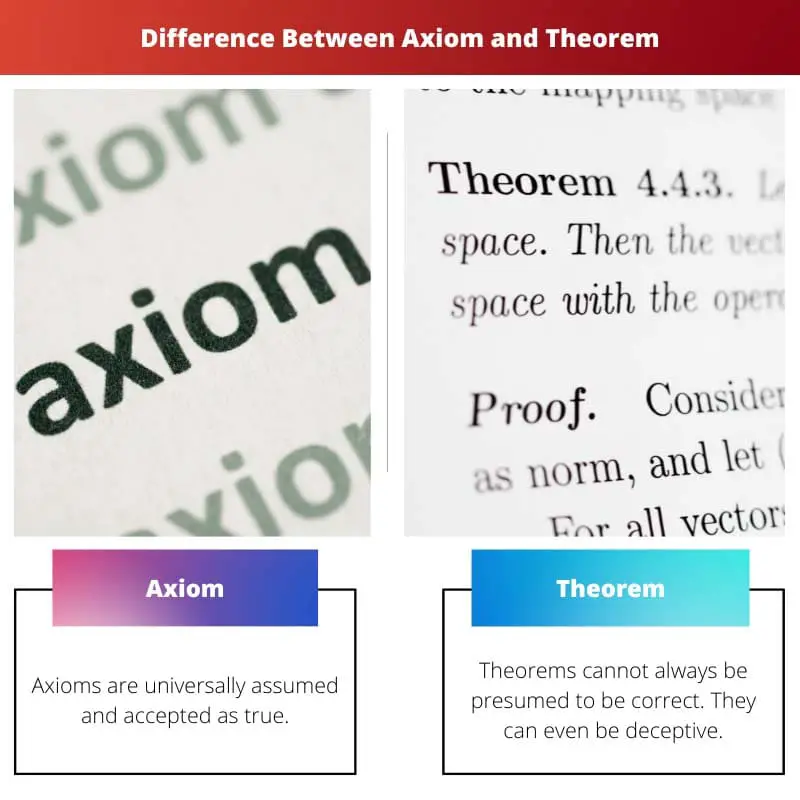Axioms serve as the cornerstone of mathematical statements or logical explanations, as well as the starting point for theorems.
The axioms plus a collection of other logical connectives are frequently used to derive theorems.
Key Takeaways
- Axioms are self-evident truths or basic principles that need no proof or justification.
- Theorems are propositions that require logical proof to establish their truth.
- Theorems build upon axioms and previously proven theorems to expand our understanding of mathematical concepts.
Axiom vs Theorem
Axioms are basic assumptions that are accepted without proof, while theorems are statements that can be logically deduced from axioms and previously proven theorems. Theorems provide new insights and understanding of mathematical concepts, while axioms give a foundation for mathematical reasoning.

Axioms are widely recognised and accepted truths. They do not, however, have any kind of particular proof or a practical way to back up that claim.
The majority of axioms are confronted with several challenges from people with intellectual minds. With time, it will become clear whether they are geniuses or lunatics.
Non-logical and logical axioms are divided into two categories based on their acceptance status.
Theorems are demonstrated using other statements, such as axioms or universally accepted propositions.
Theorems, as opposed to axioms, are more likely to face difficulties since they are subjected to a variety of derivation methods and interpretations.
The conclusion and the hypothesis are used to categorize theorems. It doesn’t matter if a theorem is true or untrue; it needs to be proven.
Comparison Table
| Parameters of Comparison | Axiom | Theorem |
|---|---|---|
| Truth | Considered true, always. | It may be true, may not be true. |
| Acceptance | Universally accepted | Can be accepted only if they are proven to be true. |
| Challenges faced | Comparatively less | Comparatively high |
| Foundation | Led by axioms | Theorems are derived from axioms |
| Proof | Doesn’t require proof | Requires proof |
What is Axiom?
Axioms are universally assumed and accepted as true. Axioms serve as the foundation stone of mathematical statements or logical explanations, as well as the point of initiation of theorems.
The majority of axioms are challenged by a variety of individuals with intellectual minds. However, with time, it will become clear whether they are geniuses or lunatics.
Axioms are classified as non-logical or logical based on their acceptance status.
An axiom is a correct statement, especially one founded on logic, that cannot be demonstrated or proven. These, on the other hand, are frequently viewed as self-evident.
Axioms are widely acknowledged and accepted truths. They do not, however, have any form of particular proof or any practical manner to back up that claim.
Non-logical axioms, on the other hand, are logical formulations that are utilized in the construction of mathematical theories. There is no requirement for any type of evidence in the case of an axiom.
Valid assertions that are acknowledged are referred to be logical axioms.
What is Theorem?
Theorems cannot always be presumed to be correct. They can even be deceptive.
Theorems are frequently derived from axioms and a set of additional logical connectives that already exist. It makes no difference whether a theorem is true or untrue; it requires evidence.
In most cases, theorems face more difficulties than axioms because they are subjected to a variety of derivation methods and interpretations.
The two components of a theorem, such as the conclusion and the hypothesis, are frequently used to categorize them.
A theorem, by definition, is a statement that is proven using previous theorems, axioms, and a set of other logical connectives.
Theorems are established using logical argument and rigorous mathematics.
Theorems are frequently proved with the help of additional claims, such as axioms or universally accepted propositions.
Main Differences Between Axiom and Theorem
- An axiom is considered a true statement, especially logic-based, which can not be demonstrated or proven. However, these are taken into consideration as self-evident.
- On the other hand, by definition, a theorem is considered a statement that is proved with the help of other theorems, axioms and a set of other logical connectives.
- Axioms are universally accepted and are considered to be true. However, they do not possess any type of specific proof or any practical way to prove that statement.
- On the other hand, through the help of logical reasoning and rigorous mathematics, theorems are proven. The statements through which theorems are proved are proved with the help of other statements like axioms or universally accepted ones.
- The majority of axioms face a lot of challenges by various Individuals possessing intellectual minds. However, with time it can be known that they are geniuses or crackpots.
- On the other hand, most of the time, theorems are prone to more challenges in comparison to axioms as they are subjected to various derivation methods and interpretations.
- Axioms are categorized on the basis of their acceptance status as non-logical and logical. Logical axioms refer to valid statements that are universally accepted, Whereas non-logical axioms refer to those logical expressions which are used in the build-up of mathematical theories.
- On the other hand, theorems are categorised based on the two components they possess, like the conclusion and the hypothesis.
- In the case of an axiom, there is no requirement for any type of proof. On the other hand, in the case of a theorem, it doesn’t matter if it’s true or false, but it needs proof.
- Universally, axioms are assumed and considered to be true. On the other hand, theorems can be not be assumed to be true always. They can even be false as well.
- The foundation stone of mathematical statements or logical explanations is led by axioms, as they also serve as the point of initiation of theorems. On the other hand, theorems are derived from the axioms and a set of other existing logical connectives.


I found the comparison provided in this article to be outstanding. The assertion that theorems require proof while axioms do not is a key takeaway. It would be beneficial to delve deeper into the historical examples of challenging axioms to support the discussion.
The article provided a comprehensive overview of axioms and theorems, presenting a clear distinction between the two concepts. The references cited also lend credibility to the content presented.
I found this article to be very enlightening and informative. I appreciate the comparison table and clear definitions provided for both axioms and theorems. It really helped to solidify my understanding of each.
I disagree with the article’s claim about axioms being universally accepted. There are many challenging axioms that are still debated by intellectuals. The distinction between logical and non-logical axioms is crucial to this discourse.
This article sheds light on the fundamental differences between axioms and theorems. I was particularly intrigued by the concept of non-logical axioms and their significance in mathematical theories.
The comparison table was helpful in delineating the disparities between axioms and theorems. It served as a valuable visual aid to comprehend the varying attributes of these concepts.